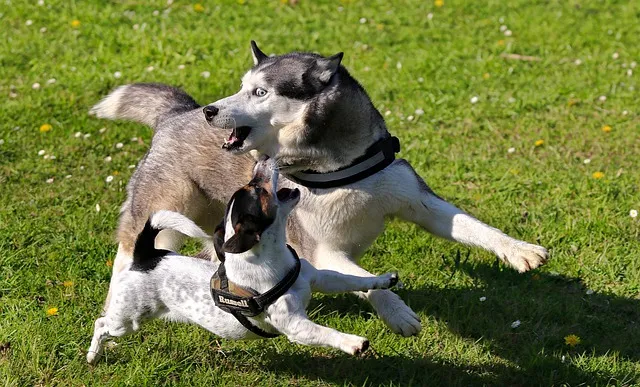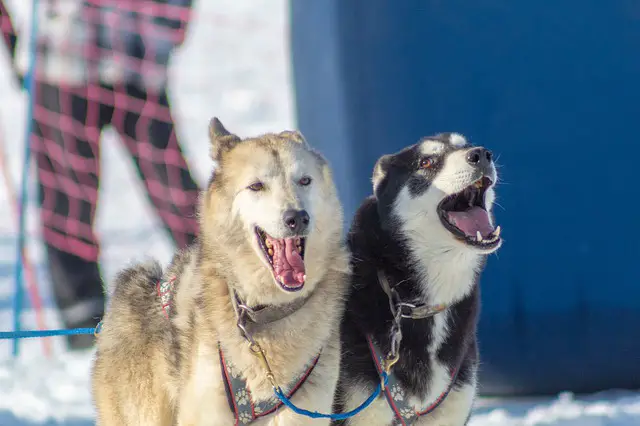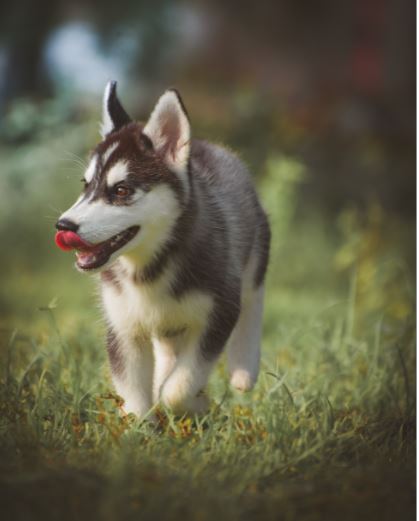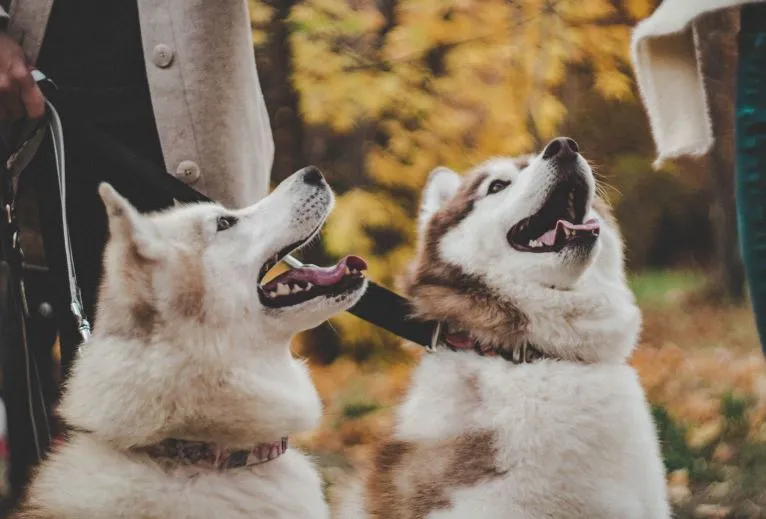The Gerberian shepsky is a wonderfully unique breed in that it is the melding of the popular German shepherd and the equally famous Siberian husky.
They are highly intelligent due to the addition of the German shepherd, yet extremely independent from the Siberian husky genes.
The Gerberian shepsky has an excellent personality with sometimes an overall puzzling appearance.
This breed is a hybrid dog and there is no way of predicting just what your shepsky will look like. They can be medium to large dogs with husky and/or shepherd colorings and different fur lengths and densities.
They often have stunning blue eyes, but these can sometimes be brown or display heterochromia, with each eye being a different hue.
For the Gerberian shepsky, just as looks are unpredictable, so can temperament and personality.
The German shepherd possesses intelligence, loyalty, and protectiveness, while the Siberian husky exudes friendliness, a highly social demeanor, and a fun-loving companion.
Generally, these traits complement one another in the Gerberian shepsky however, each of the originating breeds can display undesirable behavior at times just as any breed can.
In this post I will give you some information on Gerberian shepsky behavior problems, concentrating on Gerberian shepsky barking, and howling, and some tips to eliminate these. I will also answer the question “is the Gerberian shepsky aggressive?

For your dog’s vitamin supplement, food, toys, or other dogs product please visit the Health Extension website.
Gerberian Shepsky Behavior Problems
Being highly an intelligent breed, the Gerberian shepsky sometimes does stray with some stubbornness and independent thinking of its own.
The intelligence comes from the German shepherd’s side and the stubbornness and independence of the husky.
From centuries of being a sled dog, the Siberian husky has worked in a pack but has also had to use independent thinking when traveling with these sled-mates over the frigid arctic tundra.
Below are some behavior problems you may encounter with your Gerberian shepsky and these can be passed down from either/or originating breed.
To check your shepherds’ health status or their DNA checks, please visit the Embark vet website for all the help you may need.

Chewing
Chewing is an instinct and trait of all breeds, especially when they are puppies. When Gerberian sheepskins are puppies, they need to chew for several reasons. Chewing helps relieve gum pain caused by teething.
Chewing also cleans teeth and strengthens jaws. Even as adults, dogs still have that instinctual urge and desire to chew and this does help them to remove plaque and tartar from their teeth.
When your pup begins chewing on inappropriate items like table legs, furniture, etc., this becomes a problem.
Both the Siberian husky and the German shepherd can become bored or in some cases, extremely stressed and anxious when left alone and this, in turn, may cause them to dabble in unacceptable behavior.
Before leaving your pup alone, ensure that they are getting enough exercise. Both the husky and the shepherd are very active and energetic dogs and the shepsky is no exception to the rule. You don’t want to leave a pup home that has tons of pent-up energy.
Tire them out with some exercise and you can also consider crate training to have them in a safe space when you are away.
Make sure your shepsky has appropriate chew toys, ones that are safe but will keep them busy.
Using toys that can hold a treat or peanut butter, will keep them very engaged in trying to extract the tasty morsel and it’s also very time-consuming, tiring them out in the process.
If your pup is chewing on unacceptable items when you are home, you need to redirect their attention to a Nylabone or safe chew toy.
If this still poses a problem, you may need to pull out “the big guns” which would be using sprays on furniture and off-limits items to make them taste less appealing.
There are safe sprays available specifically for this purpose that usually have a very bitter apple taste.
Digging
Digging is another trait that is borne out of instinct. In centuries past, dogs and wolves dug to make a den, find prey, or cool off. Your dog may dig out of boredom, to bury a “treasure” or they may smell prey.
To deter this digging behavior, do not leave your shepsky alone in your yard unattended. If you see them digging, redirect their attention by playing with them or giving them something appropriate to play with. Have a child’s pool for them in hot weather to cool off in.
The last resort would be to give them a “dig pit” of their own in an out-of-the-way place in your yard. By only allowing digging in this designated spot, can satisfy that urge and desire to dig.
Chasing
Your Gerberian shepsky will have a desire to chase prey, inherited by both original breeds. Deep down, they have that inherent need to chase rabbits, squirrels, chipmunks, etc.
You certainly don’t want them to kill these “prey” and you don’t want your shepsky to chase them into dangerous areas.
Training is the only way to keep chasing a bay. Your shepsky has to know who is in charge and look to you for guidance and direction.
Chasing is instinctual and the desire will never be completely removed but with consistent training and obedience, it can be curbed.
Escaping
Your shepsky’s husky nature will be evident with their escape tactics. It’s not that they want to escape from you, they just require adventure on the other side of your fence!
They are a lot like Harry Houdini and never tire of trying to escape. They will dig under, climb or jump over a fence and even attempt to chew their way out!
Again, leaving them unattended in your yard can prove dangerous. You must be ever vigilant and keep a watchful eye when your shepsky is outside.

Gerberian Shepsky Barking and howling
For your Gerberian shepsky, barking, howling, and being very vocal can be a problem. While huskies are generally quiet, except for some occasional howling, German shepherds can be big barkers.
If your pup is barking to alert you to the doorbell or strangers, no problem. Constant barking can be an issue and quickly fray one’s nerves and your neighbors too.
This is another way dogs often act out when bored. Again, plenty of exercise helps along with toys to keep them busy.
Because Gerberian sheepskins are smart, you can use barking to your advantage by teaching them to “speak,” but when you want them to.
When they are barking, say “speak.” Then say “quiet” when you don’t want them barking. Reward them with praise or treats when they obey the commands and practice often.

Gerberian Shepsky Aggression
Any breed of dog can develop aggressive tendencies. Some dogs get a bad reputation for aggression and the German shepherd is one of those breeds, being one-half of the Gerberian shepsky. Siberian huskies on the other hand are rarely if ever aggressive.
You may be wondering if the Gerberian shepsky is an aggressive dog. No one knows exactly what traits their Gerberian shepsky will acquire from their German shepherd and Siberian husky sides.
A German shepherd is a protective breed and makes an excellent guard dog but is usually not aggressive unless trained to be.
Siberian Huskies are not an aggressive breed and make terrible guard dogs because their friendly, happy, and fun-loving nature dominates. These two breeds, in fact, complement one another.
There are no guarantees in life, just as you can’t predict if your Gerberian shepsky will develop any behavioral problems.
You can make your best effort with love and patience by using a reputable breeder, consistent training, and much socialization.